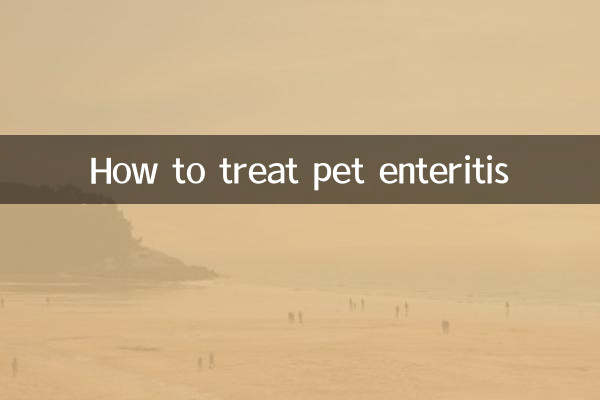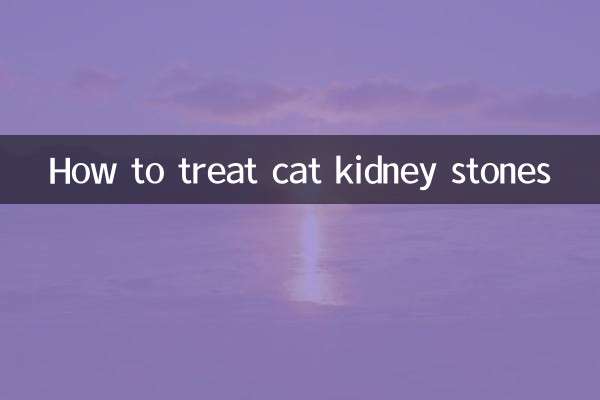How to treat pet enteritis
Recently, pet enteritis has become one of the hot topics of concern among pet-raising families. Many pet owners reported that their pets had symptoms such as vomiting, diarrhea, and loss of appetite, and were diagnosed with enteritis after examination. In order to help everyone better deal with this problem, this article will compile a detailed treatment plan and precautions based on hot discussions and veterinary advice across the Internet in the past 10 days.
1. Symptoms of pet enteritis

Common symptoms of enteritis in pets include:
| symptom | describe |
|---|---|
| Vomit | Frequent vomiting, which may be accompanied by undigested food or yellow-green liquid |
| diarrhea | Loose or watery stool that may contain blood or mucus |
| Loss of appetite | Refusing to eat or eating significantly less |
| listless | Decreased activity, lethargy, or unresponsiveness |
| stomach ache | The abdomen is sensitive and may show discomfort when touched |
2. Common causes of enteritis in pets
There are many causes of enteritis in pets. The following are some of the causes that have been discussed more recently:
| reason | illustrate |
|---|---|
| Improper diet | Eating spoiled food, excessive snacks, or sudden changes in food |
| bacterial infection | Such as Salmonella, E. coli, etc. |
| viral infection | Such as parvovirus, canine distemper virus, etc. |
| parasitic infection | Such as roundworms, tapeworms, coccidia, etc. |
| stress response | Environmental changes, long-distance transportation or being frightened |
3. Treatment methods for pet enteritis
Treatment options vary depending on the severity of your pet's enteritis. The following is a treatment plan compiled based on veterinary advice and netizen experience:
| Treatment | Specific measures |
|---|---|
| fasting food and water | Mild enteritis can be fasted for 12-24 hours to reduce the burden on the gastrointestinal tract |
| hydration | During fasting, warm water or electrolyte solution can be given in small amounts and frequently |
| drug treatment | Antibiotics, antidiarrheals, or anthelmintics depending on the cause |
| diet modification | Feed easily digestible food during the recovery period, such as prescription food or rice porridge |
| hospital treatment | Serious cases require prompt medical treatment, which may require infusion or hospitalization. |
4. Preventive measures for pet enteritis
Prevention is better than cure. The following are the effective methods to prevent enteritis that have been hotly discussed recently:
| Precautions | Specific methods |
|---|---|
| Diet management | Feed regularly and quantitatively, and avoid feeding humans high-oil, high-salt foods |
| Regular deworming | Follow veterinary recommendations for internal and external deworming |
| Vaccination | Get vaccinated on time to prevent viral infections |
| Environmental health | Keep living areas clean and disinfect food and water basins regularly |
| Reduce stress | Avoid sudden changes of environment or frequent frightening of pets |
5. Recent hot topics of discussion
According to the data analysis of the entire network in the past 10 days, the following topics have become hot topics in discussions related to pet enteritis:
| hot topics | Discussion content |
|---|---|
| Use of probiotics | How to choose the right probiotic brand and dose for your pet |
| Home medicine | Which drugs are safe for emergency treatment of enteritis in pets? |
| misdiagnosis problem | How to distinguish between common enteritis and severe infectious disease symptoms |
| Diet plan | Recipes and precautions for homemade easy-to-digest food |
| insurance reimbursement | Pet medical insurance coverage for enteritis treatment costs |
6. Special reminder
When treating pet enteritis, special attention should be paid to the following points:
1. Do not give human drugs to pets at will. Some drugs may be toxic to pets.
2. If symptoms persist for more than 24 hours or bloody stools, high fever, etc. occur, seek medical attention immediately.
3. Young, elderly or pets with weak constitutions are more likely to develop serious complications and require special attention.
4. During treatment, the environment should be kept quiet and warm to prevent pets from getting cold or nervous.
5. During the recovery period, normal diet should be resumed step by step to avoid irritating the gastrointestinal tract again.
Through the above systematic treatment plans and preventive measures, I believe you can better deal with the problem of pet enteritis. If the situation is complicated or uncertain, it is recommended to consult a professional veterinarian promptly to provide the most appropriate treatment and care for your pet.

check the details

check the details